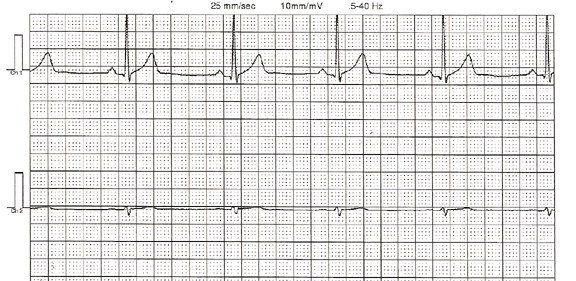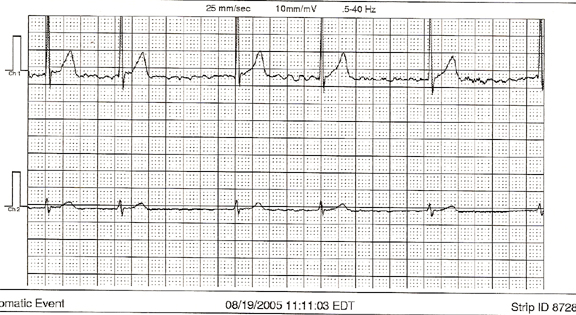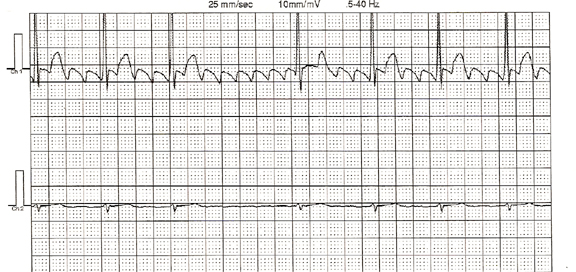
My atrial fibrillation story - 1 year post Wolf Mini-Maze 8/3/2006
Click here for an update 8/03/2021 - 15 years postscript
This is the story of my journey through a struggle with atrial fibrillation, a generally non-fatal but potentially devastating heart arrhythmia. It is intended to provide one person's experience as information to those who might also be suffering.
The raw summary is this:
About me
I'm a pretty normal guy, with the following potentially-relevant characteristics:
Prior to my diagnosis, I was on top of the world, with a blossoming career, a fine social network, and a great family. I woke up every day with tremendous gratitude for the day. That was about to change.
The diagnosis
In 2004, I started feeling unwell, but had no idea what might be wrong. It was more of a general dread of something seriously wrong, not necessarily any specific symptoms that I could focus on. At one point, I went to a doctor and told him that I felt a sensation of unexplainable doom and felt like a fool for doing so, because I couldn't tell him anything else.
Eventually, I began to notice that something funny was going on in my chest. I noticed an irregular heartbeat one day, but knowing nothing of arrhythmias, I didn't associate it with anything. In time, I also began to notice a heaviness in my chest. One afternoon at work, it got so heavy that I started wondering if I was having a heart attack. I didn't believe it for a second, but went to the ER anyway, because I was also filled with that overwhelming sense of dread. I was in atrial fib when I checked in and thus came the diagnosis.
The nature of my atrial fib
Everyone has a different experience with atrial fib, spanning from no symptoms at all to complete agony. For this reason, I include this section.
My atrial fib was paroxysmal, meaning that it came and went, spontaneously converting on its own. Episodes would last anywhere from seconds to 24 hours at the longest. I had some atrial fib most days, with shorter episodes more likely to occur close together. The long, dragout episodes typically gave me at least 12-24 hours before anything happened again.
I also had lots of other atrial anomalies, diagnosed as pre-atrial complexes (PACs) and atypical atrial flutter. All these arrhythmias co-existed with one frequently leading to another. At their worst, the PACs would come in 5-10 second intervals and persist this way for many hours. During extended fib/flutter episodes, the atrial fib and flutter would frequently alternate between the two.
During atrial fib, my resting heart rate was normally in the 70's. In atrial flutter, it was fixed at 80. With any exercise, both arrhythmias would quickly shoot up to the 150-200 range. My symptoms, therefore, were not associated with a high heart rate; rather, it was simply the way that it felt.
There really are no words to describe how it felt. Those of you who have suffered, you know. Those of you who haven't, with or without atrial fib... you are blessed to have no idea. It was a mildly physical and powerfully psychological hell that wells from deep within, as an uncontrollable, irrepressible, constant panic from the core of your instinct that says, "Your heart isn't beating right. Do something NOW." Of course, there is nothing to do, so you fester in this cloud of misery with only partial awareness of the world around you, acutely focused on every single errant beat of your heart. It is deeply rooted in the survival center of the brain and knows no relief. I know this because it was the dread in my soul before I even knew what it was.
In a relatively short amount of time, I went from happy to see each new day to disappointed. I thought of how I might find a way to escape, but was confounded each time by the realization of what such drastic action would have on my family and friends. It didn't really seem very drastic to me, though. If I've learned anything through it all, it is that there are things so much worse than death. If you die before ever feeling one of them, you have lived a good life, no matter how long or short it may have been.
Some strips, recorded by CardioNet:
Normal sinus rhythm:

Atrial fibrillation:

Atrial flutter:

Pharmaceutical trials
I tried the following medications with no success, some of them combined with others:
While the medications did not help, they did not seem to hurt either, with the exception of the Propafenone, which induced a persistent atrial fib/flutter that would not abate until I stopped the medication and it wore off. I would consider it a proarrhythmic in my case. The Sotalol slowed my heart rate into the 30's, but I didn't feel woozy or anything.
Choosing the Wolf mini-maze
Even before the medications failed, it was clear to me that I would do absolutely anything to find relief. I looked into the different procedural options available, and I chose the mini-maze over catheter ablation because:
Leading up to the surgery
I had the surgery done on August 3, 2006, at Harrisburg Hospital in Pennsylvania, by Dr. Mubashir Mumtaz of the Cardiovascular Surgical Institute of Camp Hill, PA. Although an experienced surgeon, this was the first such procedure done by Dr. Mumtaz, but this did not concern me. His commitment to performing a successful operation was obvious, including the desire to have Dr. William Schneeberger present to proctor the procedure, who helped pioneer the original procedure with Dr. Randall Wolf.
I met Dr. Schneeberger only briefly when they wheeled me into the OR, already somewhat sedated. I overheard someone say his name and I asked to speak with him. He came over and I thanked him for coming, my soul full of honest gratitude. After that. the anesthesiologist told me I was going to sleep. He was right.
The immediate aftermath
I have never experienced such physical pain in my life. I woke up with IVs in my arm, an IV in my neck, and two tubes in my chest. I'll spare you any further gory details, because I don't want to dwell on that. The only point I'd like to make is that the mini-maze is a no-joke surgery. Some people get lucky and think it was easy. I wouldn't bet on that, though.
The long term aftermath
So, what happened? The most poignant fact is that I have been free of atrial fib since, and mostly free of atrial flutter. It was a very long recovery period, with high heart rates and significant discomfort for months. But as I write this a year later, every single moment of it was worth it. I can bend over, sleep any way I want, exercise, and gulp down a glass of cold liquid without the former guarantee of atrial fib. My heart has not been completely stable, though. Here's some specifics:
All things considered, though, I am 100% better. I am actually sleeping again and NOT WAKING UP AFRAID. My exercise tolerance is very good. I feel stronger than I have in some time, although I don't feel nearly as daring as I did in years past. I would never consider running up a mountain today, just because I'm afraid.
Summing things up
A year later, I really don't know what exactly to say. I feel so much better, but the emotional scar of the disease has changed me permanently. I thought that recovery would be this jubilant event, but it is more like a slow process of coming back to life. Plus, the memory of the original pain remains fresh, while the unpredictable nature of the disease leaves me with a pervasive sense of uncertainty. I still focus on my heartbeat almost all the time, fearing that the next bump might be the return of the most dreadful thing I can imagine.
Perhaps, though, the emotional healing takes much longer than the physical healing. The disease causes a shocking loss of innocence, one that is not easily replaced. And, maybe it is true that innocence can never be replaced.
The bright spot is, though, that every now and then something makes me laugh. Laugh a lot. And I assure you, there was no laughter a few years ago, not ever.
15 years later - An update
Posted 8/3/2021
I was doing 6-month updates, but every update seemed about the same, so here is a summary. The summary of the summary is that I am still free of atrial fib.
Since the physical recovery, I now get occasional jitters such as PACs, early beats, etc., and very infrequently, short spells of some sustained atrial arrythmia. For the PACs, they tend to come in spells that last a couple weeks, then long periods (months perhaps) of mostly calm. This pattern is similar to how the atrial fib used to come in waves. For the sustained arrythmia, I'm reasonably confident that it is atrial flutter, although it's never been monitored so I don't know for sure. These spells last a few seconds to a few minutes and occur maybe once a month, on average. It does seem that over the years, things have gradually gotten slightly better, which is encouraging. In any case, it is a 100% improvement over the way I was before the surgery, so I have no complaints.
One thing of note... I quit smoking on February 14, 2011 and have definitely noticed an improvement since then. I wasn't a heavy smoker, maybe a pack a week, but it clearly had an effect on the stability of my atria. I won't go so far as to say it caused the atrial fib, but I'm now sure that it contributed. If you smoke, please consider quitting. I still drink plenty of beer and remain convinced that my condition is not affected by alcohol, at least not significantly.
This surgery gave me my life back. I am so thankful for the years that I've been given, free of atrial fib. While it was an incredibly difficult ordeal, it was worth every second of pain. I'd do it again today if I had to.